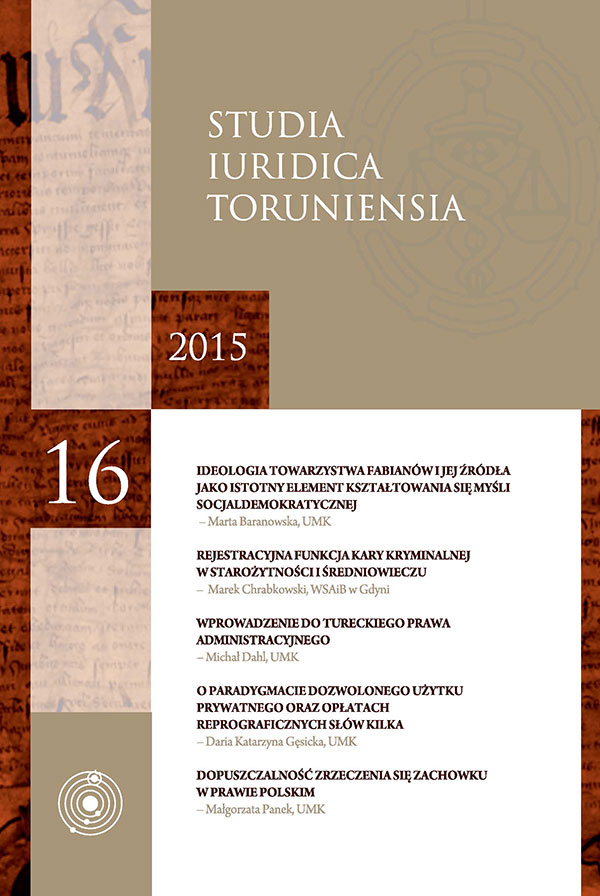The Raphael Lemkin’s concept of genocide and Daniel Jonah Goldhagen’s eliminationism. The attempt to redefine the theory of mass murders?
DOI:
https://doi.org/10.12775/SIT.2015.009Keywords
Raphael Lemkin (1900–1959), the genocide, Daniel Jonah Goldhagen (1959-), the eliminationism, The Convention on the Prevention and Punishment of the Crime of Genocide (1948), comparison of legal and political thoughtsAbstract
The mass extermination accompanied mankind since the dawn of history. However, it was in the early twentieth century, when the studies on the legal and political phenomenon started. Raphael Lemkin’s analysis led to the formulation of the first concept of the genocide in 1944, which was proposed to be included in a future international codification. Daniel Jonah Goldhagen suggested in 2009 a new approach towards the genocide in the framework of the theory of eliminationism. It is valuable from the universal law point of view not only to present and compare abovementioned ideas, but also to indicate their deficiencies. Not without significance is continuation the reflections on improvement of, regulating such an important matter, international law.
References
Anderson B., Imagined Communities. Reflections on the Origin and Spread of Nationalism, London 1983.
Bartosik I., Willma A., Ja z krematorium Auschwitz. Rozmowa z Henrykiem Mandelbaumem, byłym więźniem członkiem Sonderkommando w KL Auschwitz, Warszawa-Bydgoszcz 2009.
Goldhagen D.J., Wiek ludobójstwa, tłum. M. R omanek, Kraków 2012.
„Hominum causa omne ius constitutum est”. Księga jubileuszowa ku czci Profesor Alicji Grześkowiak, red. A. D ębiński, M. Gałązka, R.G. Hałas, K. Wiak, Lublin 2006.
Jones A., Genocide. A comprehensive Introduction, London–New York 2011.
Kornat M., Rafał Lemkin (1900–1959) – studium biograficzne, „Zeszyty Historyczne” 2004, nr 147.
Lemkin R., Rządy państw Osi w okupowanej Europie. Prawa okupacyjne, analiza rządzenia, propozycje zadośćuczynienia, tłum. A. Bieńczyk-Missala, P. Grzebyk, B. Lanckoroński, M. Madej Warszawa 2013.
Midlarsky M.I., Ludobójstwo w XX wieku, Warszawa 2010.
Mikke S., Adwokat Rafał Lemkin – wybitny nieznany, „Palestra” 2006, nr 1–2.
Rafał Lemkin. A hero of humankind, red. A. Bieńczyk-Missala, S. Dębski, Warszawa 2010.
Salmonowicz S., Recenzja: R. Lemkin, Rządy państw Osi w okupowanej Europie. Prawa okupacyjne, analiza rządzenia, propozycje zadośćuczynienia, „Zapiski Historyczne” 2014, t. 79, z. 2.
Schabas W.A., Genocide in international law. The Crime of crimes, New York 2009.
Social Contract. Essays by Locke, Hume, and Rousseau, red. E. Barker, London–New York 1967.
Szawłowski R., Rafał Lemkin – twórca pojęcia „ludobójstwo” i główny architekt konwencji z 9 XII 1948 (w czterdziestolecie śmierci), „Państwo i Prawo” 1999, nr 10.
Tokarczyk R., Komparatystyka prawnicza, Warszawa 2008.
Wybitni prawnicy na przestrzeni wieków, red. M. Marszał, J. Przygrodzki, Wrocław 2006.
Zweigert K., Kötz H., An Introduction to Comparative Law. The framework, Amsterdam–New York–Oxford 1977.
Żukowski P.M., Krakowskie czasy studiów Rafała Lemkina, „Dzieje Najnowsze” 2011, nr 1.
Downloads
Published
How to Cite
Issue
Section
Stats
Number of views and downloads: 963
Number of citations: 0



